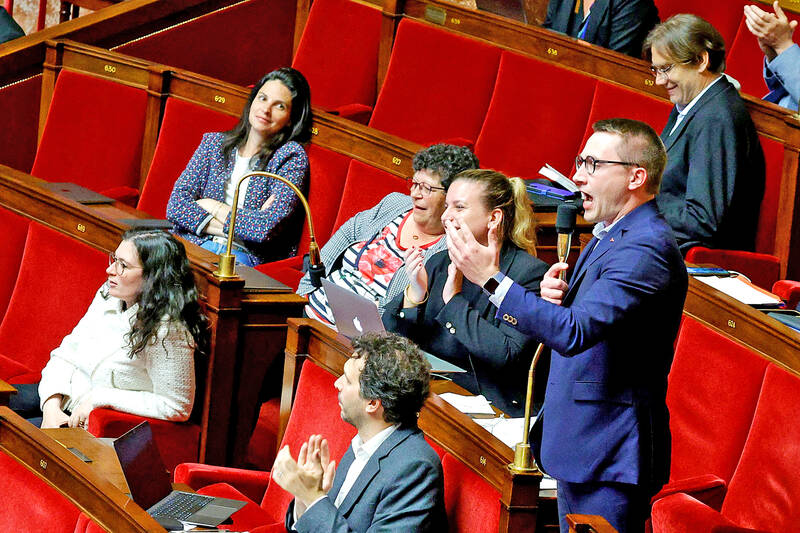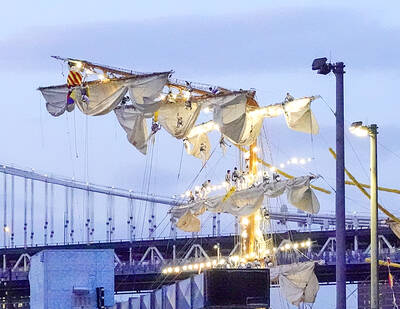Two people were killed and hundreds injured, shops were looted and public buildings torched during a second night of rioting in New Caledonia, authorities said yesterday, as anger over constitutional reforms from Paris boiled over.
What began as pro-independence demonstrations has spiraled into three days of the worst violence on the French Pacific archipelago since the 1980s.
Despite heavily armed security forces fanning out across the capital, Noumea, and a nighttime curfew, rioting continued overnight.

Photo: AFP
Hundreds of people, including “around 100” police and gendarmes, have been injured in the unrest, French Minister of the Interior Gerald Darmanin said in Paris.
One person had been shot dead overnight, but authorities were yet to establish the circumstances that led to the incident, Darmanin said, adding that dozens of homes and businesses had been torched.
The office of the High Commissioner, France’s top representative in New Caledonia, later yesterday reported a second death in the riots, without giving any details of the circumstances.
French President Emmanual Macron canceled a planned domestic trip and moved yesterday’s regular Cabinet meeting to hold a crisis meeting with key ministers on New Caledonia, his office said.
In Noumea and the commune of Paita there were reports of several exchanges of fire between civil defense groups and rioters.
Streets in the capital were pocked by the shells of burned-out vehicles and buildings, including a sports store and a large concrete climbing wall.
“Numerous arsons and pillaging of shops, infrastructure and public buildings — including primary and secondary schools — were carried out,” the commission said.
Security forces had regained control of Noumea’s prison, which holds about 50 inmates, after an uprising and escape attempt by prisoners, it said in a statement.
Police had arrested more than 130 people since the riots broke out Monday night, with dozens placed in detention to face court hearings, the commission said.
A nighttime curfew was extended, along with bans on gatherings, the carrying of weapons and the sale of alcohol.
The territory’s La Tontouta International Airport remained closed to commercial flights.
As rioters took to the streets, France’s lower house of parliament voted in favor of a constitutional change bitterly opposed by indigenous Kanaks.
The reform — which must still be approved by a joint sitting of both houses of the French parliament — would give a vote to people who have lived in New Caledonia for 10 years.
Pro-independence forces say it would dilute the share of the vote held by Kanaks, an indigenous group that makes up about 41 percent of the population and the major force in the pro-independence movement.
Macron urged calm in a letter to the territory’s representatives, calling on them to “unambiguously condemn” the “disgraceful and unacceptable” violence.
Macron said that French lawmakers would vote to definitively adopt the constitutional change by the end of next month unless New Caledonia’s opposing sides agree on a new text that “takes into account the progress made and everyone’s aspirations.”
In the Noumea Accord of 1998, France vowed to gradually give more political power to the Pacific island territory of nearly 300,000 people.
As part of the agreement, New Caledonia has held three referendums over its ties with France, all rejecting independence.
However, the independence movement retains support, particularly among the Kanak people.

BACKLASH: The National Party quit its decades-long partnership with the Liberal Party after their election loss to center-left Labor, which won a historic third term Australia’s National Party has split from its conservative coalition partner of more than 60 years, the Liberal Party, citing policy differences over renewable energy and after a resounding loss at a national election this month. “Its time to have a break,” Nationals leader David Littleproud told reporters yesterday. The split shows the pressure on Australia’s conservative parties after Prime Minister Anthony Albanese’s center-left Labor party won a historic second term in the May 3 election, powered by a voter backlash against US President Donald Trump’s policies. Under the long-standing partnership in state and federal politics, the Liberal and National coalition had shared power

CONTROVERSY: During the performance of Israel’s entrant Yuval Raphael’s song ‘New Day Will Rise,’ loud whistles were heard and two people tried to get on stage Austria’s JJ yesterday won the Eurovision Song Contest, with his operatic song Wasted Love triumphing at the world’s biggest live music television event. After votes from national juries around Europe and viewers from across the continent and beyond, JJ gave Austria its first victory since bearded drag performer Conchita Wurst’s 2014 triumph. After the nail-biting drama as the votes were revealed running into yesterday morning, Austria finished with 436 points, ahead of Israel — whose participation drew protests — on 357 and Estonia on 356. “Thank you to you, Europe, for making my dreams come true,” 24-year-old countertenor JJ, whose

A documentary whose main subject, 25-year-old photojournalist Fatima Hassouna, was killed in an Israeli airstrike in Gaza weeks before it premiered at Cannes stunned viewers into silence at the festival on Thursday. As the cinema lights came back on, filmmaker Sepideh Farsi held up an image of the young Palestinian woman killed with younger siblings on April 16, and encouraged the audience to stand up and clap to pay tribute. “To kill a child, to kill a photographer is unacceptable,” Farsi said. “There are still children to save. It must be done fast,” the exiled Iranian filmmaker added. With Israel

Two people died and 19 others were injured after a Mexican Navy training ship hit the Brooklyn Bridge, New York City Mayor Eric Adams said yesterday. The ship snapped all three of its masts as it collided with the New York City landmark late on Saturday, while onlookers enjoying the balmy spring evening watched in horror. “At this time, of the 277 on board, 19 sustained injuries, 2 of which remain in critical condition, and 2 more have sadly passed away from their injuries,” Adams posted on X. Footage shared online showed the Mexican Navy ship Cuauhtemoc, its sails furled